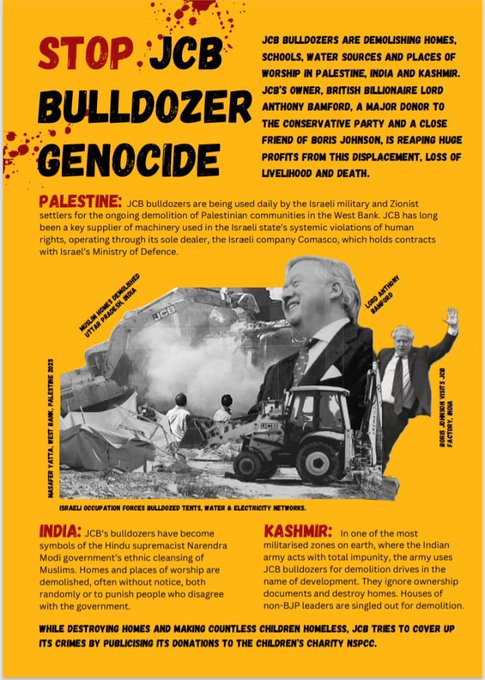The prestigious JCB Prize for Literature, India’s most lucrative literary award offering ₹25 lakh to winners, has been officially discontinued following widespread criticism over the parent company’s involvement in bulldozer demolitions in India and Palestine, reported the Indian Express.
Mita Kapur, Literary Director of the JCB Prize, confirmed the decision on June 21 but declined to provide further details. “The prize has been shut down. I am not going to deny something that is evident. But for everything else, no comment,” she said.
The award’s termination follows months of mounting criticism. In November 2024, over 100 writers, translators, and publishers issued a public letter condemning JCB’s “blatant hypocrisy,” calling out its sponsorship of a prize that celebrates literary excellence while its machinery is allegedly used to demolish homes and communities of marginalised people.
According to a March 12 notice on the prize’s official website, the JCB Literature Foundation applied to the Registrar of Companies, Delhi & Haryana, requesting revocation of its licence under Section 8(5) of the Companies Act, 2013. As a result, the entity is now required to append “Private Limited” to its name instead of “Foundation,” effectively ending its non-profit status.
Established in 2018, the JCB Prize aimed to uplift Indian literature, particularly works in translation. Over its seven-year run, five of the prize-winning books were translations, highlighting regional linguistic diversity. Past winners include:
Jasmine Days by Benyamin (2018, translated from Malayalam by Shahnaz Habib)
Moustache by S. Hareesh (2020, translated from Malayalam by Jayasree Kalathil)
Delhi: A Soliloquy by M. Mukundan (2021, translated from Malayalam by Fathima E.V. and Nandakumar K.)
The Paradise of Food by Khalid Jawed (2022, translated from Urdu by Baran Farooqui)
Fire Bird by Perumal Murugan (2023, translated from Tamil by Janani Kannan)
The Far Field by Madhuri Vijay (2019)
But the award came under intense fire as JCB, a UK-based construction equipment company, became associated with state-led demolitions of Muslim homes, businesses, and religious structures in BJP-governed states such as Uttar Pradesh, Gujarat, Madhya Pradesh, Assam, and Delhi. Between April and June 2022, Amnesty International documented at least 128 such demolitions, 33 of which allegedly used JCB machinery.
Internationally, JCB equipment has also been used in demolitions across the Occupied Palestinian Territories to clear land for Israeli settlements – actions deemed illegal under the Fourth Geneva Convention. The UN Human Rights Office had named JCB among 112 companies involved in these activities in a 2020 report.
The backlash culminated in a collective effort by literary and activist communities, with notable signatories like K. Satchidanandan, Meena Kandasamy, Cynthia Stephen, and Palestinian writer Isabella Hammad. The letter accused JCB of using literature as a “whitewashing tool” while being complicit in acts that uproot lives of the vulnerable – Muslims, Dalits, and others – across India and Palestine.
Marking the closure as a win, the South Asia Solidarity Group (SASG), a UK-based anti-imperialist organisation, stated on X, “First step to victory for the Stop JCB Demolitions Campaign. The JCB Literary Prize has bitten the dust! Thanks to all the wonderful writers & translators who signed our open letter.”




